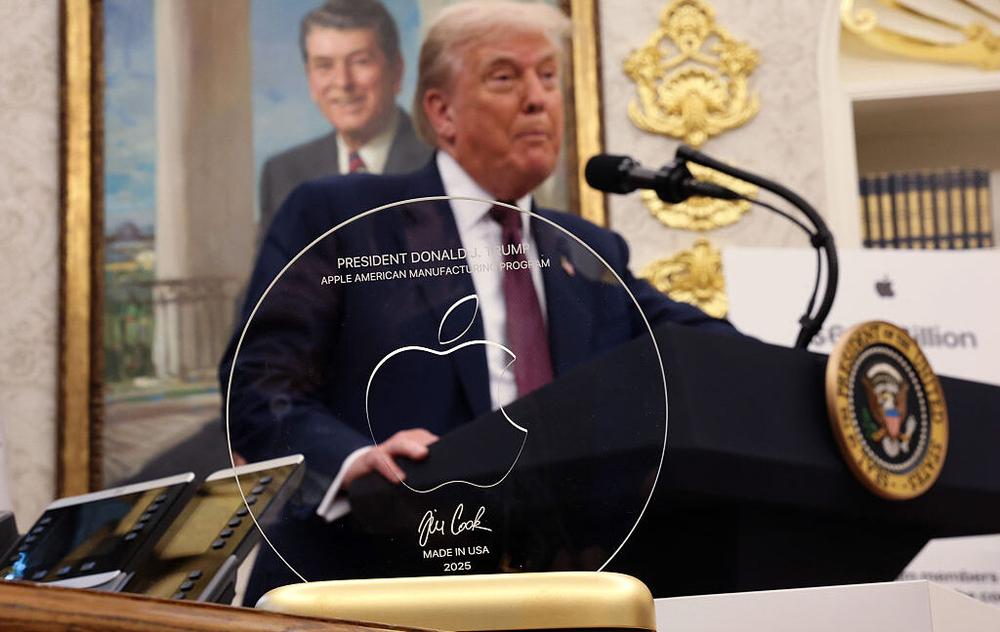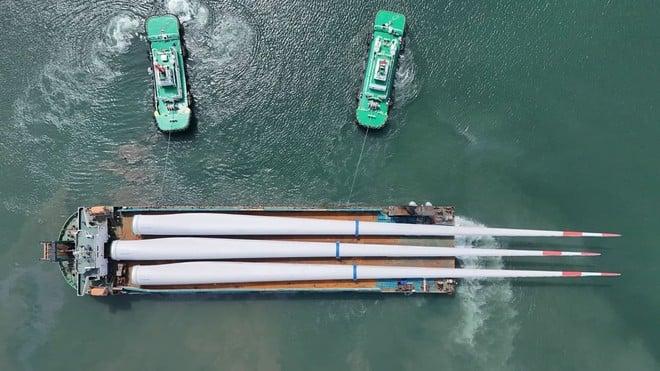It's now clear that Apple plans to survive Donald Trump's trade war by playing to the president's ego.
On Wednesday, Trump announced that Apple would be exempt from a threatened 100 percent tariff on semiconductors that could have driven up the cost of iPhones globally, Reuters reported. In an apparent effort to secure this exemption, Apple promised to increase its total investment commitment in the US by $100 billion, while also gifting Trump a one-of-a-kind statue that Apple CEO Tim Cook had engraved with Trump's name.
It serves as a bizarre love letter to Trump's push to bring tech manufacturing into the US, despite Apple resisting that push for its most popular product.
According to The Verge, the statue was made by iPhone glass manufacturer Corning—which is partnering with Apple on its US investments. The specialty glass was cut into a large circle with a giant Apple logo in the center, designed by a "former US Marine Corps corporal" now working at Apple, Cook said. Adding glitz and a kiss of the ring, it features a 24-karat gold base and a message signed by Cook that says, "Made in America." (Cook said the statue "comes from Utah.")
This strategy appears to have worked out well. Apple presented the statue to Trump at the Oval Office, where he confirmed "there will be no charge" to Apple or other companies that build US factories when chip tariffs are officially announced.
The win for Apple comes after Trump spent the spring attacking the company's plans to divert iPhone manufacturing for the US market into India rather than the US, as Trump had bid.
In April, Trump publicly promised that his trade war would result in "Made in America" iPhones, but Apple remained silent. By May, Trump appeared frustrated by Apple's supply chain moves, claiming while on a Middle East tour that he had “a little problem with Tim Cook."
At that time, Trump supposedly told Cook, "We are treating you really good, we put up with all the plants you built in China for years. We are not interested in you building in India." Analysts continued to say it would take years for Apple to divert its supply chains into the US, if it were possible at all. But the Trump administration insisted it wasn't impossible, with US Commerce Secretary Howard Lutnick claiming that Cook was planning to build "robotic arms" to replicate in the US the "scale and precision" of iPhone manufacturing in China.
On Wednesday, Trump tamped down his demands for US-made iPhones after once threatening to impose a 25 percent tariff on Apple if it did not move manufacturing into the US. After months of urgent calls to make iPhones in America, Trump said only, "this is a significant step toward the ultimate goal of ensuring that iPhones sold in America also are made in America."
Meanwhile, Cook confirmed that some parts of iPhones will continue to be manufactured in the US—saying that "semiconductors, glass, and Face ID modules are already made domestically," Reuters reported. But he vaguely kicked the can down the road when it came to projecting when US-made iPhones might become a reality, saying only that "final assembly will remain overseas 'for a while.'"
Once again, Apple escapes Trump’s iPhone pressure
Since Trump took office, analysts have suggested that Cook might be the tech CEO best prepared to navigate Trump's trade war.
During Trump's last term, Cook launched a charm offensive, wooing Trump with investment commitments to avoid caving to Trump's demands for US-made iPhones while securing tariff exemptions.
Back then, Apple notably seemed to avoid following through on some of its commitments, abandoning plans to build three "big, beautiful" Apple plants that Trump announced in 2017. Ultimately, only one plant was built, which made face masks, not Apple products. Similarly, in 2019, Trump toured a Texas facility that he claimed could be used to build iPhones, but Apple only committed to building MacBook Pros there, not the Apple product that Trump sees as the crown jewel of his domestic supply chain dreams.
This time, Apple has committed to a total investment of $600 billion to move more manufacturing into the US over the next four years. But Apple was probably going to spend that money anyway, as "analysts say the numbers align with Apple's typical spending patterns and echo commitments made during both the Biden administration and Trump's previous term," Reuters reported.
Trump has claimed that any company found to be dodging pledges will be retroactively charged tariffs if they fail to follow through on investments. However, Apple seems to be chugging along with its usual business in the US, while manufacturing iPhones elsewhere probably wouldn't change the tariff calculus, as it is now.
So at least at this stage of Cook and Trump's friendship, it appears that Apple has once again secured exemptions without committing to building a US-made iPhone or even committing significant new investments.
On Wednesday, at least one analyst—Nancy Tengler, CEO and CIO of Laffer Tengler Investments, which holds Apple shares—told Reuters that Apple's moves this week were "a savvy solution to the president's demand that Apple manufacture all iPhones in the US."

 Eminem Doesn't Seem to Mind When People Call Him 'The Guy From Fortnite'
Eminem Doesn't Seem to Mind When People Call Him 'The Guy From Fortnite'